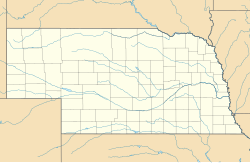Cesko-narodni sin-Milligan Auditorium | |
 | |
| Location | Junction of Main and Birch Sts., SW corner, Milligan, Nebraska |
|---|---|
| Coordinates | 40°30′8″N97°23′30″W / 40.50222°N 97.39167°W |
| Built | 1929 |
| Architect | Kritz, E.J., Stake, R.O., Urban, Karel |
| Architectural style | Late Gothic Revival, Collegiate Gothic |
| NRHP reference No. | 96000224 |
| Added to NRHP | February 29, 1996 |
Cesko-narodni sin-Milligan Auditorium, also known as Milligan Auditorium, is a historic building in Milligan, Nebraska, USA, that was built in 1929. [1] It was listed on the National Register of Historic Places on February 29, 1996. The building is a meeting hall for the Czech community. It historically hosted dances, Sokol events, films and Czech theater. [2]
Contents


